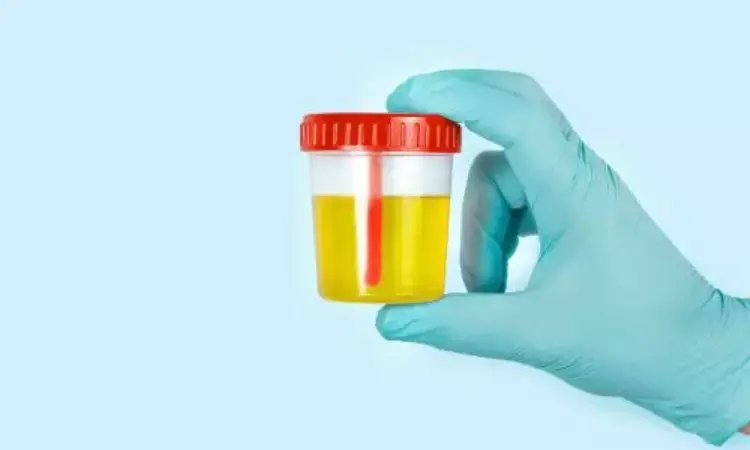- Home
- Medical news & Guidelines
- Anesthesiology
- Cardiology and CTVS
- Critical Care
- Dentistry
- Dermatology
- Diabetes and Endocrinology
- ENT
- Gastroenterology
- Medicine
- Nephrology
- Neurology
- Obstretics-Gynaecology
- Oncology
- Ophthalmology
- Orthopaedics
- Pediatrics-Neonatology
- Psychiatry
- Pulmonology
- Radiology
- Surgery
- Urology
- Laboratory Medicine
- Diet
- Nursing
- Paramedical
- Physiotherapy
- Health news
- Fact Check
- Bone Health Fact Check
- Brain Health Fact Check
- Cancer Related Fact Check
- Child Care Fact Check
- Dental and oral health fact check
- Diabetes and metabolic health fact check
- Diet and Nutrition Fact Check
- Eye and ENT Care Fact Check
- Fitness fact check
- Gut health fact check
- Heart health fact check
- Kidney health fact check
- Medical education fact check
- Men's health fact check
- Respiratory fact check
- Skin and hair care fact check
- Vaccine and Immunization fact check
- Women's health fact check
- AYUSH
- State News
- Andaman and Nicobar Islands
- Andhra Pradesh
- Arunachal Pradesh
- Assam
- Bihar
- Chandigarh
- Chattisgarh
- Dadra and Nagar Haveli
- Daman and Diu
- Delhi
- Goa
- Gujarat
- Haryana
- Himachal Pradesh
- Jammu & Kashmir
- Jharkhand
- Karnataka
- Kerala
- Ladakh
- Lakshadweep
- Madhya Pradesh
- Maharashtra
- Manipur
- Meghalaya
- Mizoram
- Nagaland
- Odisha
- Puducherry
- Punjab
- Rajasthan
- Sikkim
- Tamil Nadu
- Telangana
- Tripura
- Uttar Pradesh
- Uttrakhand
- West Bengal
- Medical Education
- Industry
Urine Test May Detect Aggressive Prostate Cancer and Reduce Biopsies: Study

Researchers have developed a new home urine test, MyProstateScore 2.0, that has shown high sensitivity in detecting aggressive prostate cancer without requiring a digital rectal exam. The test could help men with lower risk avoid unnecessary biopsies and MRIs, offering a less invasive diagnostic option.
The 18-gene MyProstateScore 2.0 (MPS2) test was previously validated for detection of grade group ≥ 2 (GG ≥ 2) prostate cancer using post–digital rectal examination (DRE) urine. To improve ease of testing, we validated MPS2 using first-catch, non-DRE urine. Patients provided first-catch urine before biopsy. MPS2 values were calculated using previously validated models differing only by extent of clinical data included biomarkers alone (BA; no clinical data), biomarkers and clinical factors (BA + CF), and biomarkers, clinical factors, and prostate volume (BA + CF + PV).
The primary outcome was GG ≥ 2 cancer on biopsy. MPS2 performance and clinical consequences of testing were compared with PSA and the Prostate Cancer Prevention Trial risk calculator (PCPTrc). -
Results: The cohort included 266 men with median PSA 6.6 ng/mL (IQR, 4.9-9.1) of whom 103 (39%) had GG ≥ 2 cancer on biopsy. The AUC for GG ≥ 2 cancer was 57% for PSA, 62% for PCPTrc, and 71%, 74%, and 77% for MPS2 models. Under a testing approach detecting > 90% of GG ≥ 2 cancers, MPS2 testing would have avoided 36% to 42% of unnecessary biopsies, as compared with 13% using the PCPTrc.
In patients with a prior negative biopsy, MPS2 testing would have avoided 44% to 53% of repeat biopsies, as compared with only 2.6% using PCPTrc. Using first-catch urine, MPS2 meaningfully improved the proportion of biopsies avoided relative to PCPTrc while maintaining highly sensitive detection of GG ≥ 2 cancer. Non-DRE testing provides a convenient, objective, and highly accurate testing option to reduce the need for imaging and biopsy in men with elevated PSA.
Reference:
Tosoian JJ, Zhang Y, Meyers JI, Heaton S, Siddiqui J, Xiao L, et al. Clinical Validation of MyProstateScore 2.0 Testing Using First-Catch, Non–Digital Rectal Examination Urine. Journal of Urology [Internet]. [cited 2025 Mar 13];0(0). Available from: https://www.auajournals.org/doi/abs/10.1097/JU.0000000000004421
Dr. Shravani Dali has completed her BDS from Pravara institute of medical sciences, loni. Following which she extensively worked in the healthcare sector for 2+ years. She has been actively involved in writing blogs in field of health and wellness. Currently she is pursuing her Masters of public health-health administration from Tata institute of social sciences. She can be contacted at editorial@medicaldialogues.in.
Dr Kamal Kant Kohli-MBBS, DTCD- a chest specialist with more than 30 years of practice and a flair for writing clinical articles, Dr Kamal Kant Kohli joined Medical Dialogues as a Chief Editor of Medical News. Besides writing articles, as an editor, he proofreads and verifies all the medical content published on Medical Dialogues including those coming from journals, studies,medical conferences,guidelines etc. Email: drkohli@medicaldialogues.in. Contact no. 011-43720751


